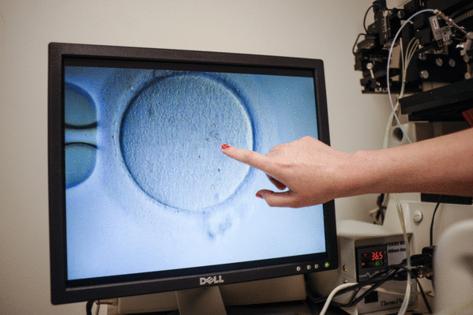Few states cover fertility treatment for same-sex couples, but that could be changing
Published in Health & Fitness
Elizabeth Bauer was working out at the gym one morning last August when she got a phone call from her fertility nurse. It was a call that Bauer and her wife, Rebecca, had long been waiting for.
Elizabeth dialed in Rebecca so they could listen together: They were pregnant.
The Washington, D.C., couple decided before they got married three years ago that they wanted to have a child. Both wanted to play a biological part in the pregnancy. So, they used a process called reciprocal in vitro fertilization, through which eggs were retrieved from Rebecca and fertilized with donor sperm to create embryos. Then one of the embryos was implanted in Elizabeth’s uterus.
Elizabeth, a 35-year-old elementary school teacher, and Rebecca, a 31-year-old nonprofit consultant, had health insurance, but it wouldn’t cover the roughly $20,000 procedure, so they had to pay out of pocket.
But beginning next year, insurers providing coverage in D.C. will have to pay for IVF for beneficiaries, including same-sex couples, who can’t conceive on their own. Only seven states (Colorado, Delaware, Illinois, Maine, Maryland, New Jersey and New York) have similar mandates. However, a new definition of “infertility” could prompt other states to follow suit.
The American Society for Reproductive Medicine in October expanded the definition of infertility to include all patients who require medical intervention, such as use of donor gametes or embryos, to conceive as a single parent or with a partner. Previously, the organization defined infertility as a condition in which heterosexual couples couldn’t conceive after a year of unprotected intercourse.
The group emphasized the new definition should not “be used to deny or delay treatment to any individual, regardless of relationship status or sexual orientation.”
Dr. Mark Leondires, a reproductive endocrinologist and founder and medical director at Illume Fertility and Gay Parents To Be, said the new definition could make a huge difference.
“It gives us extra ammunition to say, ‘Listen, everybody who meets the definition of infertility, whether it’s an opposite-sex couple or same-sex couple or single person, who wants to have a child should have access to fertility services,’” he said.
At least four states (California, Connecticut, Massachusetts and Rhode Island) are currently weighing broader IVF coverage mandates that would explicitly include same-sex couples, according to RESOLVE: The National Infertility Association. Bills were introduced but failed to advance in Oregon, Washington and Wisconsin.
...continued
©2024 States Newsroom. Visit at stateline.org. Distributed by Tribune Content Agency, LLC.







Comments